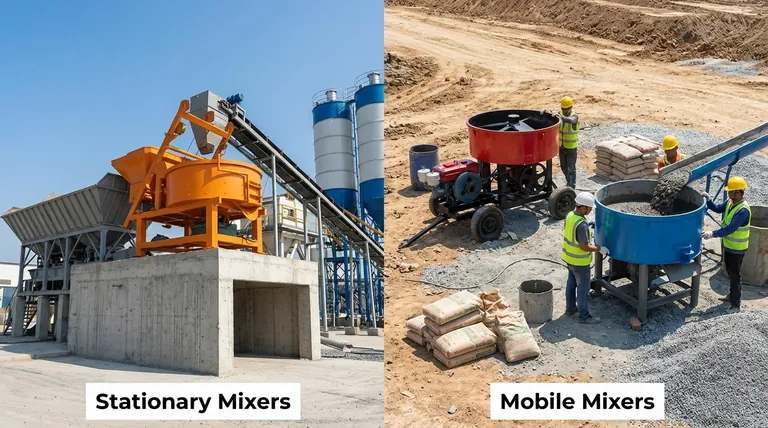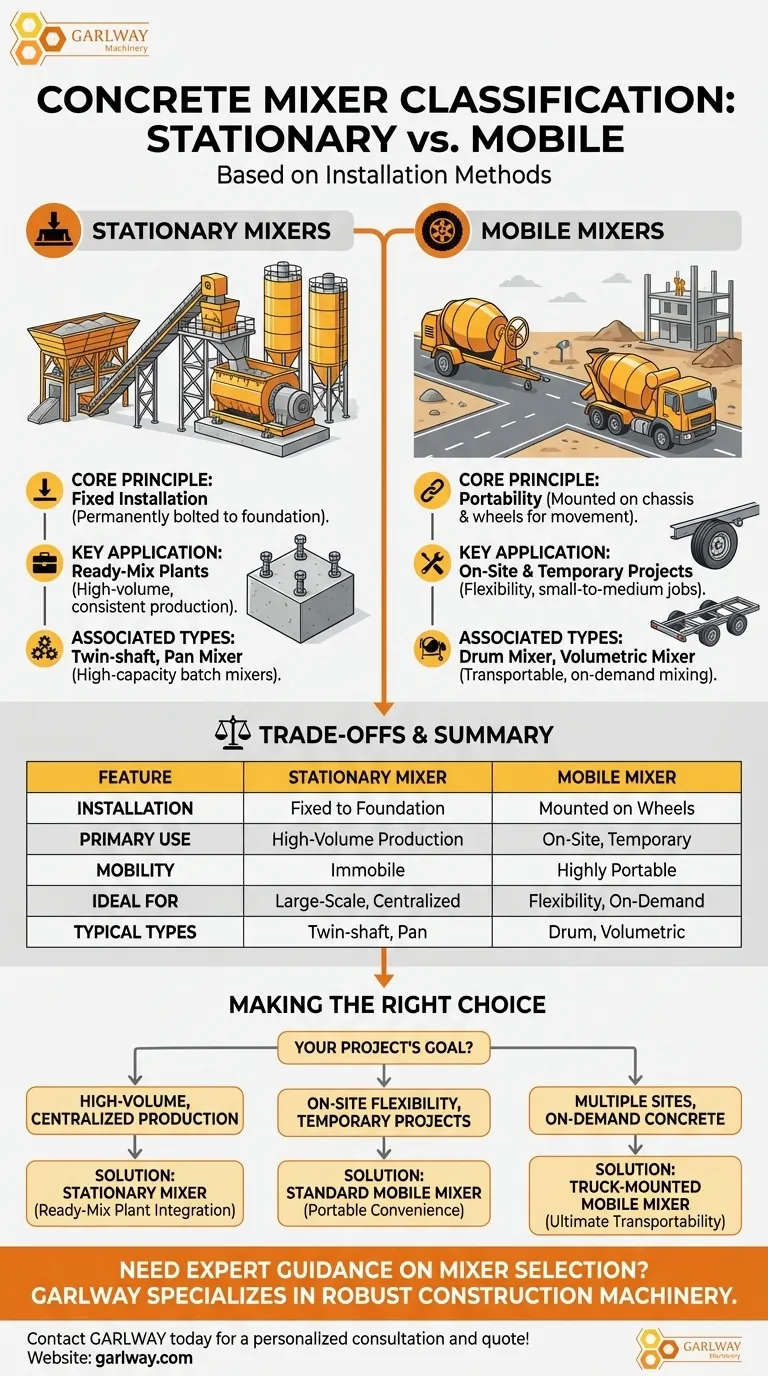Based on their installation method, concrete mixers are classified into two primary categories: stationary and mobile. Stationary mixers are permanently installed on a foundation as part of a larger plant, designed for high-volume production. In contrast, mobile mixers are fitted with wheels, offering the portability required for temporary, small, or medium-sized projects.
The choice between a stationary and a mobile concrete mixer is fundamentally a decision about scale and permanence. Stationary mixers are engineered for continuous, high-volume production in a fixed location, whereas mobile mixers provide critical flexibility for on-site work and temporary job requirements.

The Stationary Concrete Mixer: A Foundation for High Volume
Stationary mixers are the core of industrial-scale concrete production. They are not standalone machines but rather integrated components of a larger system.
Core Principle: Fixed Installation
A stationary mixer is bolted securely to a concrete foundation. This permanent setup ensures stability and allows for integration with automated systems for feeding aggregates, powder, water, and admixtures.
Key Application: Ready-Mix Plants
These mixers are almost exclusively used in ready-mix or precast concrete plants. Their purpose is to produce a consistent, high-quality product in large quantities for delivery to various construction sites.
Associated Mixer Types
While "stationary" describes its installation, the mixing technology itself is often a high-capacity batch mixer, such as a twin-shaft or pan mixer, capable of handling large volumes efficiently.
The Mobile Concrete Mixer: Flexibility on the Move
Mobile mixers prioritize portability and convenience, making them a common sight on construction sites of all sizes.
Core Principle: Portability
The defining feature of a mobile mixer is its chassis and wheels. This design allows it to be easily towed or moved around a job site or transported between different locations.
Key Application: On-Site and Temporary Projects
Mobile mixers are ideal for small-to-medium construction projects, repair work, or jobs in remote locations where access to a ready-mix plant is impractical. They provide fresh concrete exactly where and when it is needed.
Associated Mixer Types
The most recognizable mobile mixer is the classic drum mixer. This category also includes larger, truck-mounted units like volumetric mixers, which function as mobile batch plants by mixing materials on demand.
Understanding the Trade-offs
Choosing an installation method involves a clear set of compromises between production capacity, cost, and operational flexibility.
Scale vs. Flexibility
This is the central trade-off. Stationary mixers offer immense production scale at the cost of being immobile. Mobile mixers offer unparalleled flexibility but cannot match the sheer output of a stationary plant.
Initial Investment
A stationary mixer represents a significant capital investment as part of a full batching plant. Mobile mixers have a much lower barrier to entry, making them accessible for smaller operations.
Quality Control
Stationary plants provide a highly controlled environment, leading to exceptional consistency and quality control. Mobile mixing often relies more on operator skill, which can introduce slight variability between batches.
Making the Right Choice for Your Goal
Your project's specific demands will dictate the appropriate installation type.
- If your primary focus is high-volume, centralized production: A stationary mixer integrated into a ready-mix batching plant is the necessary solution.
- If your primary focus is on-site flexibility for various temporary projects: A standard mobile (portable) mixer provides the ideal balance of convenience and capability.
- If your primary focus is serving multiple, geographically diverse job sites with fresh concrete: A truck-mounted mobile mixer offers the ultimate in transportable, on-demand production.
Ultimately, choosing the correct installation method hinges on matching the mixer's permanence to the scale and location of your concrete production needs.
Summary Table:
| Feature | Stationary Mixer | Mobile Mixer |
|---|---|---|
| Installation | Permanently fixed to a foundation | Mounted on a chassis with wheels |
| Primary Use | High-volume production in ready-mix plants | On-site, temporary, or smaller projects |
| Mobility | Immobile | Highly portable |
| Ideal For | Large-scale, centralized production | Flexibility and on-demand mixing |
| Typical Mixer Types | Twin-shaft, Pan mixer | Drum mixer, Volumetric mixer |
Need help selecting the right concrete mixer for your project's scale and mobility requirements?
At GARLWAY, we specialize in providing robust construction machinery, including a full range of stationary and mobile concrete mixers, winches, and batching plants. Our solutions are designed to maximize efficiency for construction companies and contractors globally.
Let our experts guide you to the perfect equipment that balances production capacity with operational flexibility. Contact GARLWAY today for a personalized consultation and quote!
Visual Guide

Related Products
- Hydraulic Concrete Mixer Machine Cement Mixing Equipment for Mixture Concrete
- Construction Products Concrete Plant Machine Mixing Concrete Mixer
- HZS25 Best Cement Mixer for Quick Mix Concrete at Bunnings
- Portable Concrete Mixer Machine Equipment for Mixing Concrete
- HZS75 Concrete Batching Plant Cement Mixer Price Concrete Mixer Bunnings Mixing Plant
People Also Ask
- What is the difference between a concrete plant and a cement plant? Clarify Your Construction Material Supply Chain
- How much to start a cement plant? A Deep Dive into Costs and Strategy
- How does a continuous concrete mixer work? Unlocking High-Volume Production
- What are the disadvantages of ready mixed concrete? Navigate Logistical & Cost Risks
- How should one handle the use of concrete mixing station equipment during thunderstorms? Essential Safety Protocols



















